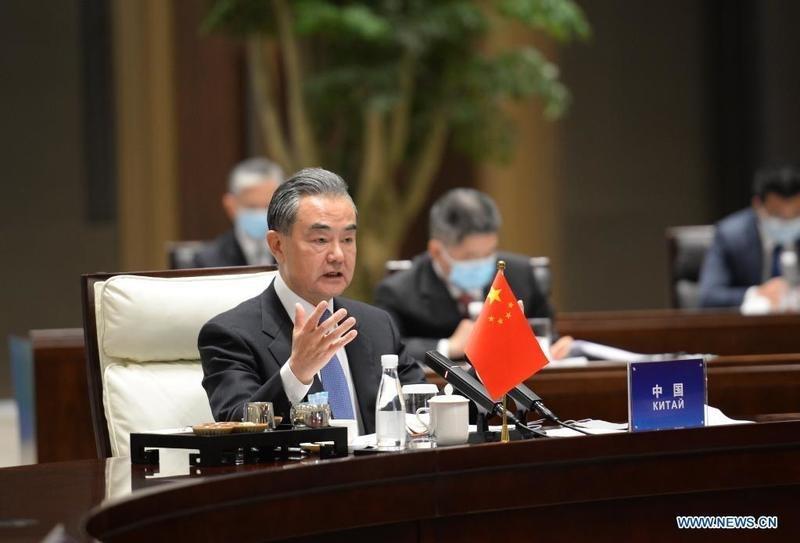 Chinese State Councilor and Foreign Minister Wang Yi hosts the second meeting of China + Central Asia (C+C5) foreign ministers meeting in Xi'an, capital of northwest China's Shaanxi province, May 12, 2021. (WEI XIANG / XINHUA)
Chinese State Councilor and Foreign Minister Wang Yi hosts the second meeting of China + Central Asia (C+C5) foreign ministers meeting in Xi'an, capital of northwest China's Shaanxi province, May 12, 2021. (WEI XIANG / XINHUA)
State Councilor and Foreign Minister Wang Yi held separate discussions with the Afghan foreign minister and the national security adviser to the Afghan president on Monday night, as Beijing stepped up its efforts to advance the peace and reconciliation process in the nation.
China is ready to facilitate negotiations among various parties in Afghanistan, including creating necessary conditions for negotiations in China, Foreign Minister Wang Yi said
The two phone calls focused on how to resolve the conflict that has beset Afghanistan for decades.
In his phone conversation with Afghan Foreign Minister Mohammad Haneef Atmar, Wang said that China will as always speak up for the independence, sovereignty and dignity of Afghanistan and call on all parties to support and implement related United Nations Security Council resolutions to promote a smooth transition of the Afghan situation, in particular to avoid the resurgence of terrorism.
In a phone call with Hamdullah Mohib, the national security adviser to the Afghan president, Wang stressed that China endorses the "Afghan-led, Afghan-owned" principle and supports all parties in Afghanistan in finding a broad and inclusive political arrangement through peaceful means.
ALSO READ: Wang highlights support for peace in Afghanistan
China is ready to facilitate negotiations among various parties in Afghanistan, including creating necessary conditions for negotiations in China, he said.
Although the unilateral withdrawal of US troops at this crucial stage of the Afghan domestic reconciliation process has brought uncertainty to the situation in Afghanistan, peace is the trend of the times as it fully complies with the fundamental and long-term interests of the Afghan people and is also the common expectation of the international community, Wang added.
Last week, in talks with foreign ministers from Central Asian countries and in a phone conversation with his Pakistani counterpart, Wang noted the necessity for Afghanistan's neighbors to strengthen communication and take coordinated action.
Abiding by the purposes and principles of the UN Charter and promoting the political settlement of regional hot spot issues has been a major issue for the UN Security Council this month as China holds the rotating presidency for May.
In this busy month, China has actively taken measures to help de-escalate tensions on hot spot issues which included a UN Security Council open debate on "the situation in the Middle East, including the Palestinian question" which was chaired by Wang on Sunday.
Wang Feng, an associate professor of Afghan studies at the Chinese Academy of Social Sciences, said that the situation in Afghanistan is about to enter an important transition period as clashes between the Afghan government and Taliban militants have increased recently and peace talks were postponed after the final phase of troop withdrawal by the US and its NATO allies began this month.
"It is against such a background that China expressed its support for the political settlement of the Afghan issue and its opposition to the solution through use of force," Wang Feng said, adding that this is a position that China always adheres to on hot spot issues as a permanent member of the UN Security Council.
"It will be a good thing for both Afghanistan and its people if the current conflicts and clashes can be solved through peaceful talks. This is also what China wishes to see," she said.
READ MORE: What it takes for long-term peace in Afghanistan
Li Weijian, a Middle East expert at the Shanghai Institutes for International Studies, said the negative impact of the irresponsible withdrawal of the US troops from Afghanistan, which is expected to be completed by September, is bringing turbulence and even terrorist attacks to the Afghan people.
"The resurgence of extremist forces is very likely. Therefore, the future peace and stability of Afghanistan requires the international community, in particular major countries and neighboring countries, to play a greater constructive role," Li said.


